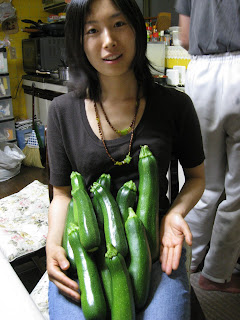This was taken a few days ago:

In the front right, with the yellow flowers, is zucchini. Immediately behind that is daikon, and behind that is sweet peppers, chili peppers, basil and goya (aka bitter melon). To the right of goya is corn and cauliflower. To the left of the zucchini is a row of morning glory (aka water spinach), the dark green chijimina (similar to bok choy) and behind that is more morning glory. To the left of that row is eggplant, tomato, cucumber and spinach (in the back).
Here is Ayumi with a few days worth of zucchini:

Here's another angle on the veggies:

From front to back: spinach; water spinach; (L to R) goya, basil, chili pepper, sweet pepper; corn and one of the eight cauliflowers.
This has been an awesome experience for me. Watching the plants grow has been magical. And it's a wonderfully enjoyable culinary experience to pick fresh, pesticide- and herbicide-free plants outside your home and to be eating them within the hour. For one, the food tastes great--fresh, delicious, full of life. But also, it's very gratifying to be feeding ourselves food that we know is so healthy.
And it was really pretty easy to do. In fairness, my father-in-law, an experienced grower, was doing all this with us, so that helped. But it was all fairly straight-forward. This is what went into it:
First, my father-in-law used a machine to mix up the soil and plow it into rows. Ayumi and I then spent a few hours forming the rows and smoothing the surface. My father-in-law then applied small amounts of chemical fertilizer (he composts, but the compost was not sufficient by itself--in the future, I hope to learn how to grow veggies 100% organic) and we waited a week. Then we planted seeds and seedlings. We've watered them daily since then. Once every few weeks we've had to pull out weeds by hand. And a few times we sprayed charcoal vinegar (a natural insecticide) to discourage some little bugs who were eating the young zucchini and chijimina leaves. So it hasn't really taken up that much time, and what time we have spent (watering, weeding, etc.) has been really enjoyable and relaxing.
It's about 6pm here, the sun has just gone down below the hills behind the house, so it's time to water the plants. Then I'll harvest something for dinner. I think tonight we'll use moning glory, chijimina and zucchini. Mmmm.....